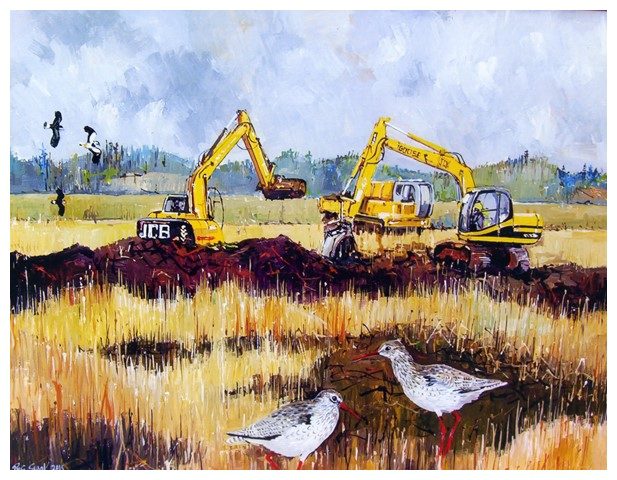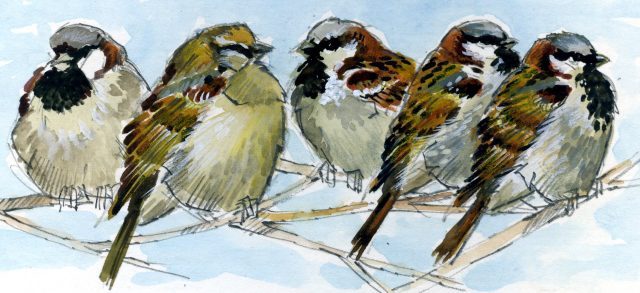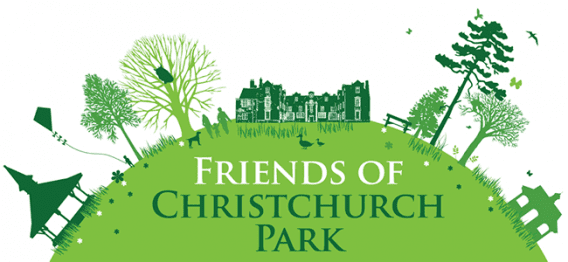Well, January has departed. It was a long period of gloom, especially if we add on the last week of December, cold, fog, and misery. But now we are in February, a short month and then, well, spring. A few days ago, still in January, I was listening to Radio 4 and, surprisingly, a piece of pop music was played. Why? I think that somebody on that station was also fed up with January. The piece of music? A group called Pilot were singing about how sick and tired they were of January. Never mind, February so far has been sunny and mild, spirits rise and we can be positive.
I must mention waxwings. We just had to have waxwings if only to brighten up this winter. Waxwings, beautiful colours, are seen feeding on red, yellow and white berries in Ipswich and Martlesham. Hundreds of people feeling better, not so tired and staring at these lovely visitors. Something to be cheerful about. Other birds on my bird feeders include goldfinches – what a splash of colour. One colour stands out – yellow. The American singer, Guy Mitchell, sang “her yellow curls go swinging” from his hit song “Chicka, boom, chicka rack” and so the yellow of the goldies’ wings were swinging back and forth as five or six of them hung on to the bird feeder. Be gone Stygian gloom.

Along the footpath at Waldringfield, the River Deben on one side and the Waller reserve on the other (God bless you, John), it was difficult to concentrate with so much going on. On the Deben, teal and widgeon, so close, teal silent, widgeon noisy. Well, the males were. Something spooked the waders putting up black-tailed godwits, yes black tails but with conspicuous white rumps. Curlew too also calling. Come on, who does not love the call of the curlew? I listen to them on our river and get a tingle up my spine. I have heard them on our nesting moors too – even more of a tingle. The waders disappear into the mist, still calling. The Waller reserve is now fully established.
A heron watches over John’s legacy, motionless as herons often are. A couple of barn owls, white ghosts, appear out of the mist. Can they really hunt in this weather?

A flurry of yellowhammers take wing and quickly settle down. Was it me who scared them? Don’t think so, as breaking cover is a fox. No, two. Everything seems to be searching in the sodden reeds and grass. I can still see the yellowhammers. They, too, are in breeding plumage, although the sentinel of a heron will have young before the ‘hammers’ nest. I know that this reserve is not large but when I stood here with John, and we surveyed this area we both envisaged what a delight this reserve would be and so it is. Thank you, Rev!
Christchurch Park is a big, green oasis in the centre of Ipswich. To locate it, follow the dog walkers. But amidst this gloom of winter, Christchurch Park offers relief. There are squabbling mandarin drakes on the Wilderness Pond. Why are they painted so gaudily? Who designed them?
And as spring approaches, listen to that spotty bird on the highest branch of the chestnut tree next to the Mansion. If comfort is needed this winter, then the mistle thrush will give you that. So mellow, so beautiful. How often the song of a bird is heard in a troubled world? I think of the nightingales that sang in ‘no man’s land’ during the First World War in the calm before the storm, as those young soldiers found themselves amidst this horror. And I recall one of my favourite poems by Edward Thomas called “Adlestrop”. It’s about a man on a train that stops unexpectedly at Adlestrop and during his extended wait a blackbird is heard singing (yes, I remember Adelstrop). Birdsong costs nothing. How dull life would be without songbirds.

Even those chirpy little house sparrows make us smile and lift our hearts.
I see from my ancient notes that along with my admiration for Adlestrop there is also a reference to Henry Reed’s poem “The naming of parts”. It is about a bored National Service recruit who, along with other members of his squad, is being shown the various parts of a .303 rifle. It is high summer and as the Weapons instructor drones on so this soldier, obviously, the author becomes detached. Likewise, it is a very hot day, so his mind wanders. I remember that feeling so well. I was far more interested in listening to a blackbird singing from a lime tree on the edge of the Barrack Square than to tune in to the Instructor. “And now we have naming of parts – this is the cocking piece, this is the breech and this is the lower swing swivel and this is the piling swivel of which you have not got…” – and that is a blackbird.
Reg Snook
